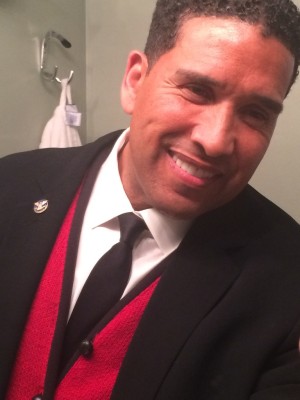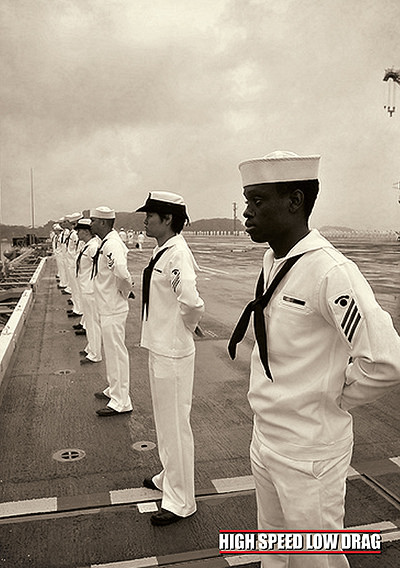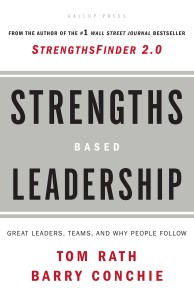 High Speed Nation, John Lee Dumas here, and I am fired up to bring you our featured guest today, Jimi Page. Jimi, are you prepared to ignite?
High Speed Nation, John Lee Dumas here, and I am fired up to bring you our featured guest today, Jimi Page. Jimi, are you prepared to ignite?
Jimi: Give me a second, John. Ignited.
John: Oh, man. Love it, Jimi. Jimi is the founder of Page After Page Incorporated. He is in the business of helping other companies increase their business performance through more efficient document management programs by providing free printers, copiers, high speed color printers, managed IT services, maintenance and tech support. Jimi, give our listeners a little overview. So take it, man. Tell us about you personally and then we’ll dive in.
Jimi: John, like I’ve always begin, I always start with my family because that’s my energy. That’s the wind underneath my wings. I’ve got five children. I’ve got three boys, two girls. I’d been married 29 years. Just recently, I renewed my vows with my wife in Hawaii. And I’m just having the time of my life right now. Thanks, John.
John: Wow, that’s amazing, Jimi. I mean, I can remember having you back on EntrepreneurOnFire and was just struck immediately by just your sense of joy, your sense of just positive energy. And why do you have that? It’s because you made the decision to do so. And that’s kind of one of the things we’re going to be getting into today, is that we all have decisions to make in life. Those decisions internally can really guide us as far as taking in the negatives or blocking those out and really focusing on what matters most.
You have your priorities straight, Jimi, and I love that I going to be able to really introduce to that and more to High Speed Nation today. So, Jimi, we always start with a success quote. Take it away.
Jimi: My success quote is:
“Regardless of how tall your father was, you still have to do your own growing.”
And that’s by Abraham Lincoln.
John: And he was a pretty tall guy.
Jimi: He had it all.
John: It’s really interesting, when you look, Jimi, kind of like at the history of celebrity children and other children of like vast multimillionaires and billionaires, a lot of times, they’re the ones that struggle the most because they didn’t have to do their own growing and they never were forced to by their parents. They were just given that silver spoon. And it’s kind of sad to say.
Jimi: It is. It is. And a lot of parents today that are successful actually have made commitments not to leave their children their money until a certain age just because of that same thought, John.
John: Yeah, like 50.
Jimi: 50, exactly.
John: So, Jimi, now, let’s really kind of hone in here because we’re limited on time today and you have so much value to give. We’d like to start these interviews off with your military experience. Just tell us one story of a pivotal moment that you had in the military.
 Jimi: Pivotal moment I had in military was, of course, the day that I decided to join the military. And that was leaving high school. And then leaving high school, decided I wanted to be an officer in the Navy. And I shared this story with you once before and I just feel that it just resonates with my life and what drives me. It’s because in making a decision to go into the military, I wanted to be an officer. And being so young at that time, I didn’t realize what all that entailed.
Jimi: Pivotal moment I had in military was, of course, the day that I decided to join the military. And that was leaving high school. And then leaving high school, decided I wanted to be an officer in the Navy. And I shared this story with you once before and I just feel that it just resonates with my life and what drives me. It’s because in making a decision to go into the military, I wanted to be an officer. And being so young at that time, I didn’t realize what all that entailed.
Besides being at a proper age, graduating college and, of course, having the business acumen to do that. Well, I made the decision to go into the military and visit our local recruiter. And the recruiter for the military told me that I wouldn’t be able to make it into the Navy, in Naval Academy because I did not graduate high school. I left early. But he instructed me that, basically, I can go down to the Navy, United States Navy, and join as an enlisted.
To which I did that. And me and a friend of mine, we both go on a buddy-buddy plan. His name also happened to be James too. And we both went down there. But before we could go down there, we found out that we had to have our GED, which basically is a high school equivalent. We both took the test. I failed it. He failed. But I found out that I failed about one point. So I was so close. So close. So we had to wait two weeks to retake it.
I went back two weeks and, of course, I went to get my buddy, who is James, and I knocked on his door. I said, “Hey, James, we’ve got to go take the test.” And with that, James looked at me and he said, “Well, I’m not going to go take the test. I don’t want to go to the Navy. I decided to change my mind, kind of get a job and take care of my options here.” Well, I did. I went by myself to join the military. I decided I wanted to do it. So I went down, took the test, and John, delayed came the mail, two weeks late, and my mother told me that I passed the test by one point.
John: One point. Your life has been an all-around one point.
Jimi: One point, I know. So I was able to enter into the Navy. And to answer your question, that’s where my whole life changed and began. That probably was defining moment of my life.
John: Now, it’s a defining moment. And, I think, again, it just goes back to the decisions that we make. Your friends made a decision where if he had somehow passed that test the first time around, his life would, for sure, had been very different, maybe better, maybe worse, who knows for sure. But the same with you, Jimi. So every decision we make does have consequences both good and bad. And it’s just something to think about.
Take care of measure. Take a step back. Don’t just plunge in blindly and really think your path out. Jimi, what I wanted to really do now is to kind of turn the spotlight a little bit away from you getting into the military and the experiences you had to specifically the transition out. Because that’s what this focus of our podcast is today. We’re really talking to veterans who have just transitioned out, those who are transitioning out right now, and then those still in the military who are about to transition.
So tell us the story about your transition from the military. What failures, challenges, obstacles you faced and what lessons you learned?
Jimi: My transition was an interesting one and one probably all military member see is you spend all your time in the military trying to receive a rank and grow and pay and statue and so called power that you get from having one stripe, two stripes, three stripes. And with that, no sooner than you work hard and you get all the stripes that you get, you’re going to the civilian world and nobody has stripes and nobody cares about stripes.
So the story that I want to probably relate this to is a job that I took at a place called Marlo Furniture. It was a furniture shop that sold furniture like these Chairs in Myrtle Beach, SC. But the one interesting thing about that is that this furniture shop had different nationalities of people that were selling furniture to their own kind. For example, you had Asians selling furniture to Asians. You had Indians selling to Indians. You have people from India selling to Indians. And you have just a collective group of individuals. And, of course, you have the Marine Corps ex chief selling to all the Marine Corps people [0:08:57] [Indiscernible].
So here you have me, James Page, just fresh out the military, my first job, looking to impress everybody. Well, John, I sold to everybody — white, blue, green, purple, yellow. It didn’t make a difference. And I was determined to win. Well, they had this board on who would be the number one salesperson each month. And the leader board, of course, were names that I could never pronounce where these guys came from. It didn’t make a difference.
But I went at selling to everyone. That was my strategy, to sell to everyone. And I get along with everyone. Well, I did to that. To my dismay, I would come out to my car and my tires were slashed. I had notes on the car that said: Leave my customers alone. And it was so indicative of the world. And I’ve got such a lesson there. But I did make number one. And I made number one because of the openness and the honesty and transparency of my personality.
Someone asked me, “Well, how could you communicate with these people? Did you know their language?” And I said, “Yes. It was a smile and a handshake. It was universal.” And I made the one sale that even today still stands. They had a $19,000 and I know the name. It’s called a [0:10:26] [Indiscernible] marble bedroom furniture set. John, I sold that set to a customer who came in. They looked at it. They laughed. And then they called me later on and they brought it over the phone. So I have the record of selling a $19,000 furniture set over the phone.
But I think I really learned a lot about how civilian world and corporate world worked and the stripes didn’t matter. You have to be able to meet everybody on your level.
John: Can we really dive into that? I mean, what do you think just like at the core, the base, that really allowed you, Jimi Page, this guy that didn’t have all of these necessarily connections and wasn’t playing the ethnicity game, what was the core? What was the base that really brought you to the forefront?
Jimi: I think one thing that I learned in life at a very young age was that, and the quote that I heard was: Never give a sword to a man who can’t dance. And what I mean by that is that in life it’s not going to be a one-two-three-four or ABCD. Sometimes, it’s one-four-nine-six-two-three and A-H-I-O. And in the military world, sometimes we follow orders one, two, three, four. And what I learned in professional life is that once you do number one, you don’t do number two. You don’t do number three.
You do the next number one thing. And then after you do number one, you do the next number one thing. But there’s no two, three, four, five in business. You’re always working on the number one thing.
John: Working on the number one thing. I mean, High Speed Nation, to me, that means focus. That means get those blinders off and really don’t let those weapons of mass destruction take over your life. Don’t let that bright shiny object get you going left and right when there’s one straight path to what is success. And you can just laser beam focus on that. And, Jimi, my favorite acronym in the world is FOCUS — follow one course until success.
Jimi: Until success.
John: You know it, my man. You’re one of my favorites. I mean, you’re a past guest. You listen to the show. You’re a veteran. I mean, you just can’t get better than Jimi Page. So, Jimi, again, I hate the fact that we’re in this time constraint because your stories are epic. So anybody listening, you need to hear a longer version of Jimi Page’s story. Go to EOFire.com. Just type in “Jimi” in the search bar and his podcast will pop right up. Listen to that. It’s incredible.
And, Jimi, let’s fast forward now to an aha moment you’ve had, a light bulb that you’ve had at some point and just in a couple of minutes, share that light bulb moment with our listeners and really the steps you took to turn it into success.
Jimi: John, this is easy. Of course, like all military members that come out is you feel loss. I had five jobs. I worked at a gas station. I worked at Marlo Furniture. I worked at IBM. I worked at a pharmaceutical which was an AIDS-testing place. And I also told my wife I had a paper route and I was head paper boss. Well, with all that work, I hardly got the chance to see my children or my wife. And then to top that off, I started my own business.
Well, with that, one day I’m at Nordstrom. It’s a clothing store. I’m buying a suit. And I had already left the military. I was two years out. And I hear this guy talking about a ship. So then as I listened further, I found out he was a captain in the Navy. So he said something and I made a joke about the ship and I said, “I must have scrubbed a lot of those floors.” He came to me. He says, “What do you do, son?” And I told him, “You know, I had just started my own business. I worked at some part time places.”
He said, “I’ll tell you what.” He said, “If you took this class?” It was a leadership class. He said, “I guarantee you it will change your life.” He said my sons are all lieutenants in the field. I took it. My two sons took it. He said, “I guarantee you, it would change your life.”
So at that time, I was going some problems with my wife. We were considering divorce and I just couldn’t really kind of grasp a lot of things, the changes that were going on. But it’s been so long since I took an order from a captain, I signed up the next day. Well, to make a long story short, I took the course. My life got on track. My wife, my relationship with my wife and children got on track. And I was able to make enough money to start my own business and I never looked back.
Well, I lost contact with the captain and I would say probably about 15 years later, I’m at the dry cleaners and someone says to me, “Hey, I like those boots you got on.” So I turned around and I said, “Wyman [Phonetic]?” And he looked at me and said, “James?” And it was like little hearts encompass our heads. And we hugged each other. So he asked me how I’m doing. I said I’d been in business for 20 years. I said, “Well, how are you doing?” He says, “I’m great. I retired.” He said, “But you’ll never guess?” He said, “What’s going on with my son?” I said, “What’s that?” He said, “My son is captain of Seal Team 6 and he is credited with capturing Osama Bin Laden.”
John: Get out.
Jimi: And he now works for me as a contractor. And this is Captain Wyman. So, this someone who didn’t get his degree, someone who couldn’t go on to the military as an officer, to hire a high ranking officer as one of your leadership sales team, sales manager is just incredible. It’s an incredible journey.
John: Wow, that is full circle, Jimi. I just love how you tell stories. I love how you weave these tales. And, man, there’s so much more I want to get into. But we are going to jump straight into the lightning round because, Jimi, this is where we can really get a lot out of you in the five minutes that we have left in our chat today. So are you ready to ignite?
Jimi: I’m ready, John.
John: What is the most difficult adjustment that you had to make in the civilian world?
Jimi: I would say adaptability.
John: Adaptability. What business advice would you pass along, Jimi, to those who are making the transition now?
Jimi: I would say find your passion. What is it that you want? The world will actually make a hole. In the military, we have a term when if you wanted to go somewhere on the ship, you would say, “Make a hole, make a hole.” And everybody just gets out your way. It’s no different in life and business. Once you know what you want, people will make a hole and they’ll help you and they’ll be so giving. But you have to know what you want.
John: God, that’s such a great analogy. Jimi, what’s one of your personal habits that you believe contributes to your success?
 Jimi: John, I’ve got a quote that says: You should always wake up before the sun. And I’m the type of person that I like to stay in shape. I go into the gym and like all military people in the military, you go through training to build up your core. I mean, they teach you habits. They teach you strength training. They teach you response time. They teach you esprit de corps. They teach you team building. But they don’t teach to react from your heart.
Jimi: John, I’ve got a quote that says: You should always wake up before the sun. And I’m the type of person that I like to stay in shape. I go into the gym and like all military people in the military, you go through training to build up your core. I mean, they teach you habits. They teach you strength training. They teach you response time. They teach you esprit de corps. They teach you team building. But they don’t teach to react from your heart.
Your heart is the second largest muscle aside from the skin that we have. I’m sorry, the second largest organ aside from the skin that surrounds your body. And going to gym, you lift weights and you do things. But I go to the gym not for success. I go to the gym to fail. Not to lift weights, but to fail.
John: I love that.
Jimi: That’s the only way you grow. And a lot of times you go these gyms and you see people doing the same thing to succeed. They’re doing what they’re good at. But you don’t see them pushing the envelope to find something, some weight that they can lift that they never lifted before and then leave. You can do that for five minutes, pick up the biggest weight that you haven’t lifted and leave and you get just as much effort out of it.
John: It’s so true. And that’s actually why I love CrossFit. Because, Jimi, every time I go to CrossFit, I get crushed in a completely different set of muscles in a completely different area than I did the day before and I wake up sore in different places and it’s a great feeling.
Jimi: Yes.
John: Jimi, what’s a one book that you would recommend to our listeners?
 Jimi: I have a book and that book is called Leadership. And I wish I could mention the author but it comes up just Leadership. Okay, it’s called Strength Based Leadership: Great Leaders, Teams and the People Who Follow Them.
Jimi: I have a book and that book is called Leadership. And I wish I could mention the author but it comes up just Leadership. Okay, it’s called Strength Based Leadership: Great Leaders, Teams and the People Who Follow Them.
John: Beautiful. I know our listeners will be able to make that book happen, Jimi. And listen, Jimi, what I want to do now is just thank you, first and foremost, for being so open with us for sharing the stories that you did. I’d love for you to give us just one parting piece of guidance and then share the best way that we can connect with you and then we will sadly say goodbye.
Jimi: I will say to all of the militaries — First of all, John, I’ve got to salute you like I always do and thank you for service.
John: Yeah.
Jimi: And all the military individuals that are out there that are service-disabled, I’ve got to share this one quick story. It was a lady. And this was on the Ted Talk. She lost both of her limbs in the Boston marathon. She was invited to teach, to speak to a group of children at the school but her conditions were she didn’t want the mothers to come. She just wanted the children.
And with that, all the children came in. They hugged her. She had to actually tell them, “I didn’t have any legs but the reason why that I brought you in here today is that I want to be able to be the highest jumper, the fastest runner and I was thinking what kind of legs should I have?” And one of the children said, “You can have frog legs.” And the other child said, “Well, no, you should have rabbit legs.” And another child said, “No, no, no.”
John: Kangaroo.
Jimi: Antelope. And Kangaroo. And then, finally, this little girl said, “Why don’t you want to fly?”
John: Woah.
Jimi: And that’s what I want to pass on to the veterans. You’re looking for a job, you’re looking to be higher. You guys have the leadership skills that the military taught you that’s the best of the best. You need to find your passion and go fly.
John: Jimi, I mean, what better way to end than with goose bumps all over my body. And High Speed Nation, you are the average of the five people that you spend the most time with. And you’ve been hanging out with Jimi and myself today, so keep up the heat. And, Jimi, thank you for being so generous with your time, expertise and experience. High Speed Nation salutes you and we’ll catch you on the flipside.
Jimi: Be safe, John, bye.
Veterans, your education doesn’t stop here. Go to highspeedelite.com to join the exclusive veterans mastermind that will give you the unfair advantage to succeed in both business and life. We have dozens of training courses, HD videos, a private Facebook group, and the chance to interact daily with John and other successful veteran entrepreneurs every month on live hangouts and webinars.
